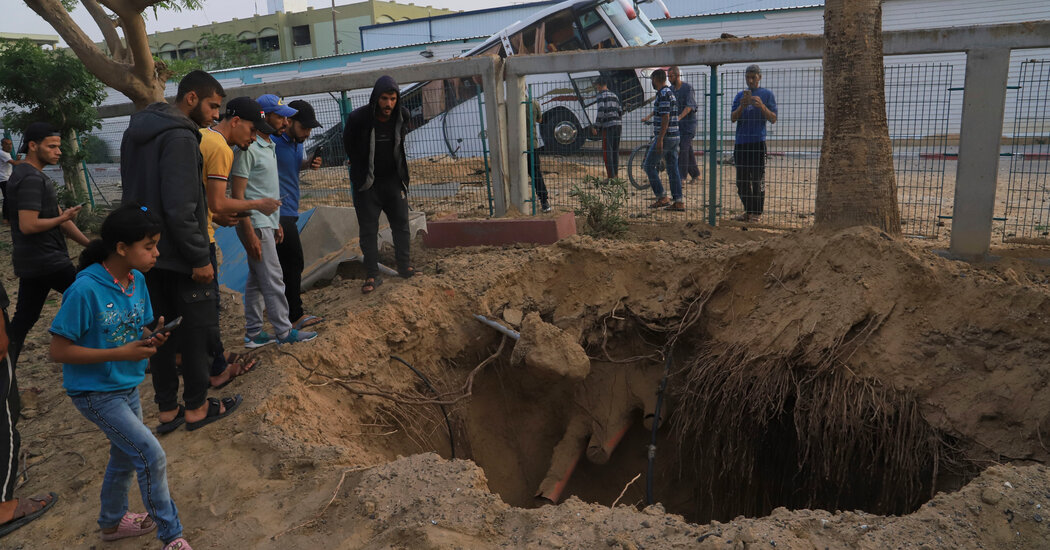Israeli fighter jets bombed the southern Gaza city of Khan Younis on Tuesday evening in an attempt to kill Muhammad Sinwar, one of Hamas’s remaining top leaders in the enclave, according to three Israeli officials.
All three officials spoke on the condition of anonymity because they were not authorized to speak publicly.
Around the same time, the Israeli military said its forces had struck a Hamas command center underneath the European Hospital near Khan Younis. An Israeli military spokeswoman declined to say whether Mr. Sinwar had been targeted in that strike. The health ministry in Gaza said that at least six people had been killed in the strike on the hospital, with at least 40 others wounded.
Pillars of smoke billowed around the hospital after the bombardment, according to videos from the scene that was verified by The New York Times. It was unclear whether hospital buildings had been damaged in the strike.
Saleh al-Hams, a doctor at the European Hospital, said the bombing had shaken the compound, terrifying the doctors and patients within. “All of our appeals to the world were for nothing,” he said in a phone call.
Israeli officials have accused Hamas of operating from inside Gaza’s hospitals — claims corroborated by some Palestinians in Gaza, as well as some former Israeli hostages who have said they were held there. Hamas, as well as hospital officials, has denied the allegations.
Israel has threatened another major military offensive in the Gaza Strip unless Hamas lays down its weapons and turns over the 20 living hostages it still holds, along with the remains of around 40 others. Hamas leaders have refused to disarm, adding that they will not release the captives unless Israel ends the war.
Mr. Sinwar is believed to be one of the most senior Hamas military commanders left in Gaza after more than a year and a half of devastating war with Israel. He is the younger brother of Yahya Sinwar, the Hamas leader killed by Israeli forces last year and who had masterminded the Oct. 7, 2023, attacks that set off the war.
Throughout the war, Israel has repeatedly sought to methodically eliminate Hamas’s hierarchy, picking off not only Yahya Sinwar, but also Muhammad Deif, the head of its military wing; Ismail Haniyeh, the group’s political chief; and numerous others.
The repeated assassinations have yet to compel Hamas to accept Israel’s terms for a cease-fire, however. Two of the Israeli officials said that by eliminating the younger, hard-line Mr. Sinwar, they hoped to remove a particularly intransigent negotiator.
Mr. Sinwar was serving as the head of operations in Hamas’s military wing when the militant group launched the 2023 attack on Israel. Since his brother’s death, he has assumed a more prominent role in Hamas, particularly in southern Gaza.
If the younger Mr. Sinwar has been killed, past experiences suggest that Hamas may be less willing to compromise in the short term while potentially be more malleable in the longer term. After Israel killed Yahya Sinwar in October, for example, Hamas announced that its resolve had been strengthened. Three months later, the group agreed to a truce.
But it could be some time before there is clarity about Muhammad Sinwar’s fate. Throughout this war, the Israeli military has often taken weeks to confirm a target’s death, while Hamas has sometimes taken months to do so. Israel announced the death of Mr. Deif last August — more than two weeks after killing him in a strike in July. Hamas did not acknowledge his fate until January.
Mr. Sinwar has opposed compromises with Israel in cease-fire negotiations, according to the two Israeli officials and a Middle Eastern intelligence official, who spoke on condition of anonymity because they were not authorized to speak publicly.
He adamantly opposed compromising with Israel’s demand that Hamas put down its weapons, even as some members of the group’s leadership outside Gaza urged a middle road, the Middle Eastern official added. Mr. Sinwar also rejected Israeli offers of exile from Gaza as part of a truce, the official said.
Like other Hamas commanders, Mr. Sinwar is believed to have spent much of the war underground in an effort to evade Israeli airstrikes.
But in recent months, Mr. Sinwar had been seen aboveground in Khan Younis at least three times, including at Nasser Hospital and an apartment complex known as Hamad City, said the Middle Eastern intelligence official.
Julian E. Barnes, Aric Toler and Johnatan Reiss contributed reporting.











